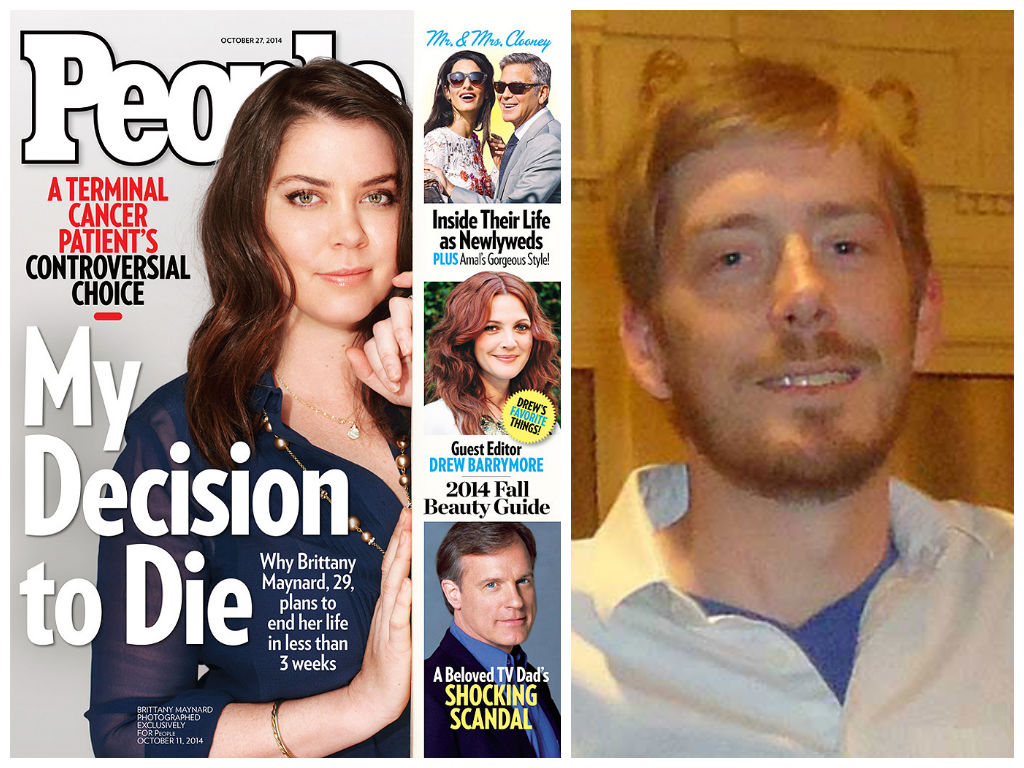EDITOR’S NOTE: On Nov. 1, Brittany Maynard ended her own life at her home in Portland, Ore.
If all goes according to plan, 29-year-old Brittany Maynard will end her life on Nov. 1.
You’ve probably heard about her. Faced with a diagnosis of a malignant brain tumor (a stage 4 glioblastoma), in April she was given about six months to live. After researching her options, Brittany moved with her husband to Oregon, one of only five states with a Death with Dignity law. (She describes her choice in this video.) This law allows a terminally ill and mentally competent adult to request life-ending medication, and for a doctor to prescribe it. Brittany can take those drugs whenever she’s decided she has suffered enough.
To describe this as a controversial topic hardly does justice to the complex feelings people have surrounding it. I’ve been thinking and talking about this stuff with my friends for a long time. I am healthy (for now), but on paper, faced with the same diagnosis Brittany Maynard is facing, I like to think I would make the same choice she’s making. I believe the terminally ill should have the right to choose how and when they’ll die.
And yet. Helping a dying friend made me realize on a much deeper level that none of us can really know what we’ll want until we’re in it.
Chris Doheny died on February 20, 2013 at age 31 from complications following a double lung transplant. He had cystic fibrosis, a genetic disease causing mucus to build up in the organs, primarily in the lungs and pancreas. He was diagnosed when he was just seven months old, and as he wrote in this 2009 article for Glamour, the doctors told his mother not to get too attached to him. He passed milestones his doctors warned him he might not, high school graduation, college, working full-time, and living on his own.
In April 2012, almost two years after a seemingly successful double lung transplant – a last resort for people with cystic fibrosis – months of rejection and frequent hospitalizations had left Chris exhausted, yet clear-headed. He didn’t want any more treatment. He wanted to go home to his parents’ house in New Jersey to die.
Chris and I had always talked about death, mostly his, though often quite broadly. We met when he was an intern at Audible.com, where I worked. Soon after he started, I heard the amazing radio documentary “My So-Called Lungs” about Laura Rothenberg, a college student with cystic fibrosis facing a double lung transplant. I knew Chris had CF but didn’t know how fatal the disease is until I heard Laura’s story.
Being someone who’s curious and nosey in equal parts (read: a journalist), I asked Chris to lunch. Halfway through the sushi special, we made a little pact: I could ask him anything and if I went too far, he’d tell me to stop.
Of course I asked everything – why he’d want a regular job when he likely had so little time left, how he managed friendships and girlfriends, his thoughts about dying. I asked. He answered. And that became a thing in our ten years of friendship that followed. If I asked him something, even something really hard, he’d respond honestly. We talked all the time about non-illness stuff, the stuff of many friendships, such as movies, his girlfriend troubles, and work gossip, but I had some level of access to this other part of Chris’ life –one he didn’t share with most people. He jokingly called me his life social worker, and I took this privileged role seriously.
We talked about my father’s work at a geriatrician specializing in palliative care, books about changing the way we face end-of-life issues, such as “How We Die” and “Last Rights.” When Frontline aired a documentary about assisted suicide, we watched it simultaneously, texting our thoughts in real-time. When Terry Gross interviewed Judith Schwarz of the non-profit Compassion & Choices (the same group that’s been helping Brittany Maynard), we listened. We were talking about other people’s dying, but we both knew we were talking about his.
So when Chris made the hard decision to go home and die, a process he thought would take a few months but turned out to be 10, I felt a responsibility to continue our ongoing discussion about what he wanted. I was close with his family and girlfriend but wanted to carve out a space where if he needed me to help start a conversation about ending his suffering, I’d figure out what was possible.
As with most people dying of a chronic illness, it was quite bad at the end. The multitudes of pain medications still left him in pain much of the day. He was unable to get out of bed, leaving him utterly dependent in a way that he said he couldn’t have fathomed. I worried he was living for someone or something else – his girlfriend, his parents, the novel he’d nearly finished. After a particularly distressing conversation with his girlfriend one night toward the very end, I went to ask him what he was thinking. Did he have some magical thinking that the outcome was going to change? Why he was continuing to take the IV antibiotics? Why not just stop?
His answer surprised me. In all our talk about the right to die with dignity and my sense that he’d want to skip the bitter end, he told me he didn’t want to hasten his death. He’d never imagined he’d let things – himself – get so bad, but as long as he could have a couple of hours without intense pain each day, the sun was shining and his coffee tasted good, that was enough. I remember just thinking, OK, that’s a choice, too. It was his. He died a week later, his way, two days after he stopped the antibiotics that had kept him tethered to life.
I like to think that if faced with a terminal diagnosis such as Chris’ or Brittany’s, I’d take whatever steps I could to be in control of my death. But what the hell do I know? Watching Chris endure those hard final weeks and still choose to live reminds me you can never know until you’re in the position yourself.
I just hope the very brave and public way Brittany Maynard is making her decision will help us as a society move closer toward a big conversation about how we die, without passing judgment. Chris would have liked that.
EDITOR’S NOTE: The Christopher Doheny Award is for a $10,000 prize and promise to publish a fiction or nonfiction book on the topic of serious physical illness by a writer who has personally dealt with or is dealing with life-threatening illness, either his or her own or that of a close relative or friend.
When she’s not reading books about death and dying, Kerry Donahue teaches radio journalism at Columbia University Graduate School of Journalism. She’s heartened by Ira Byock’s encouragement to say the four things that matter most when you’re helping someone you love die, “I love you. Thank you. Please forgive me. I forgive you.” Follow her on Twitter @KerryDonahue.









